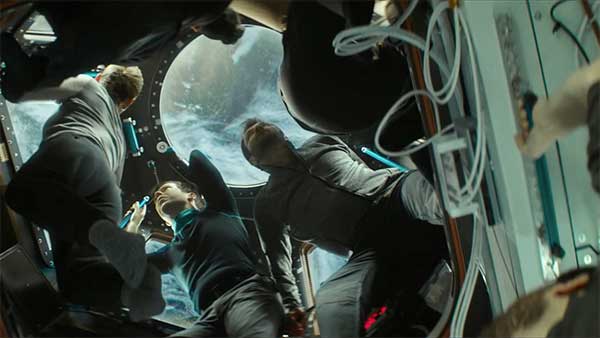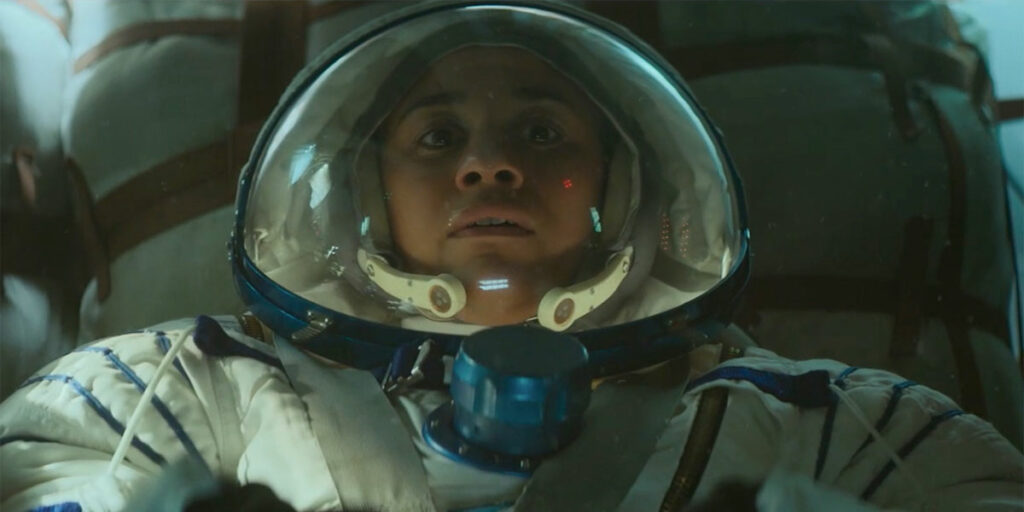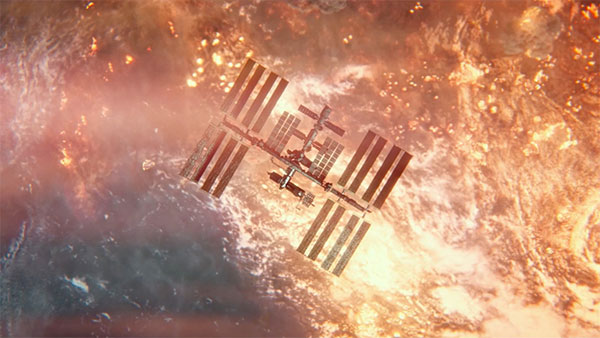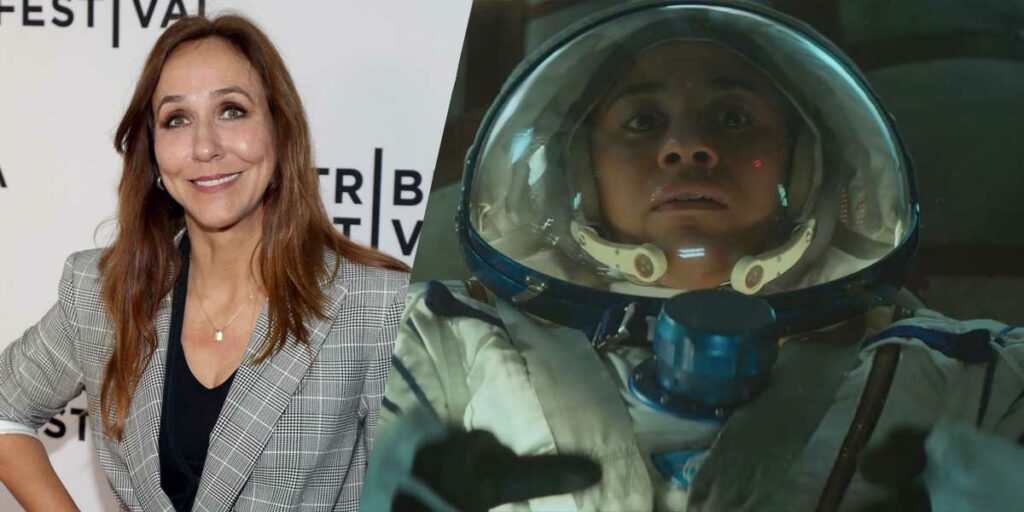Prior to I.S.S.’s premiere at the Tribeca Film Festival, we sit down with director Gabriela Cowperthwaite to discuss her latest film.
Director Gabriela Cowperthwaite’s first thriller I.S.S. follows Dr. Kira Foster (Ariana DeBose), a scientist on the International Space Station, which boards three US and three Russian scientists. Even though these countries are commonly perceived as enemies, they make sure that Earth issues stay on Earth. When there has been an act of war between both countries, this can no longer be the case. The US and Russia secretly contact their teams on the I.S.S. explaining the situation and tasking them to take control of the ship by whatever means necessary.
I.S.S. is a nail-biting thriller from start to finish. Cowperthwaite is able to successfully center the character’s emotional state making the audience feel for these scientists regardless of what country they are from. This film is also quite political, drawing a lot of similarities to current times. Right before I.S.S.’s premiere at the Tribeca Film Festival, I had the opportunity to interview Gabriela Cowperthwaite. We discussed our excitement for the festival, our love for the actors in this film, and what made it all so thrilling.
The Origins of I.S.S. and Bringing the Film to Tribeca
Is this your first time bringing a film at the Tribeca Film Festival?
Gabriela Cowperthwaite: It’s my first time ever at Tribeca. I’m so excited! I can’t wait to be in New York and be privy to what their audiences are into. I’ve wanted to go to Tribeca forever. So, I’m really excited.
Yes, me too. It’ll be my first time attending the festival as well, I couldn’t be more excited. How did this project come to you?
G.C.: It came to me via LD Entertainment. They’re the people who did my first narrative feature, Meghan Levy, and I have a good working relationship with them. Pete Shilaimon and Mickey Liddell found the script, which was written by Nick Schaefer. It was his first script. It’s a very cool, plot-driven film, and I looked at it and thought, “It’s so cool that you’re thinking of me for this!” I then told them what I felt I could bring to it and did my director’s pass, that had to do with the characters and the character work.
Who are these people? How can we make them have humanity and make them have this emotional depth? All the things that they do are a result of who they are, so those challenges were what made this film seem so fun and so cool. I love thrillers, I love horror, and I love all these things that I haven’t completely been able to do prior to I.S.S. In the past. I’ve tried to make Blackfish and The Grab, my recent doc, like a thriller. I’ve always loved that genre and I love putting people on the edge of their seats. This was an opportunity to unapologetically make a thriller. So, it was a new challenge, and I was super excited about it.

Gabriela Cowperthwaite on I.S.S. ’s Cast
You talked a little earlier about how you want to make sure I.S.S. was character-driven. How did the casting process work?
Gabriela Cowperthwaite: Gosh, I think one of the first things we did was find Ariana [DeBose, who plays Kira Foster]. Our casting director said, “there’s this woman, and she’s really talented”. And I was just obsessed with her. She did a read and even just talking to her, I remember just knowing that she was the one. West Side Story had not come out yet, so just the idea that she even had to read for a role, is like a joke if I think about it now! You see what she can do in that film, and it was so cool to be able to sort of see her in this new genre. She’s a tough character, and yet she has all this vulnerability. That’s what Ariana does right: you see every emotion on her face. You see her feel things deeply, then you see her kick ass and make decisions that are completely based on humaneness. She has a love for humanity, and just seeing that in your lead protagonist, especially since she is a female is so exciting.
Ariana DeBose and Chris Messina were easily my favorite part of their last films, West Side Story and Air respectively. It was awesome to see them both working together on screen.
G.C.: That’s right, Chris! Yes, I can just go on. Chris Messina [who plays Gordan Barrett] came in and was a no-brainer. Everything I see him in, it’s just like you’re saying: I feel this way about John Gallagher Jr [who plays Christan Campbell]. They’re the best things about the projects that they’re in. And also, I never question anything. I’m in the film with them. I truly believe that they are 100% that character. Those are my favorite kind of actors. They’re so measured, such pros, and they’ve been doing Broadway for a billion years even before film. They’re just so good. And you really require that, for this kind of film.
In thrillers, sometimes you have the genre actor who just says the thing, in a really cool, thriller way. And when they say a line, it’s like they’ve waited their whole lives to say that line. I want that on display: I want it to feel human. They have the ability to make you feel that. Pilou Asbæk [who plays Alexey Pulov] has the same talents, even though he comes from more villain work. He was so excited for the challenge of playing a vulnerable character, and he brings every bit of himself to everything he ever does. In I.S.S., he’s so three-dimensional, and you’re feeling his decisions as a human being: you’re feeling his humanity. On top of that, Masha Mashkova just blew me away, especially with her emotional depth. Her character [Weronika Vetrov] has some of my favorite scenes in the film.
How did you create that tense environment on set? Or was there even a tense environment?
G.C.: That was all real. It was really hard to film on a stage for three months, during COVID, so we were all double-masked, on a dark cold stage. And all the actors were tethered with harnesses, completely uncomfortable, to make it all look more realistic. There are different contraptions that are more comfortable, but they don’t really look like zero gravity. I just told the actors, “Oh, I wish I could put you in this comfortable little thing, this seesaw thing, but would you mind just being in these terrible diapers for three months?” [laughs]
They all said, “of course,” because we wanted to make the best film possible. Everyone was giving their all in these crazy environments, but I think that film is better for it, even though I don’t really know if it was fun. You know what I mean: sometimes, the production is really fun: everyone bonds a lot, and we would bond a bit on set in those types of scenarios. But there was no hanging out afterward, with COVID, and we were all exhausted anyway. We were all putting ourselves in a hard space to do a hard movie, and I hope you feel that when watching.

How I.S.S. Relates to Global Politics
Did the global crisis that we’re going through with Russia and Ukraine have any influence during the filming of this movie? I know that it was a little bit before, if I’m correct, but has that had any effect on how you think the film will be perceived?
Gabriela Cowperthwaite: I think it will have that effect. I hope that what people see is that the film is really about the human beings in it. Yes, huge, universal things are always happening in the world and always will, but this is about how we humanize each other. In the worst of circumstances, how can we see my success as being your success, rather than only feeling safe when we feel like I will survive? If we bring about somebody else’s demise, that’s a horrible way to go through life. I think, in a lot of ways, that’s what the infrastructure of the world, and what nationalism has called for. And so, when you look at it in this one example of six people in close quarters who are forced to make tough decisions, what you’ll hopefully gain is that we can approach life differently, right? We can trust, we can humanize, and we can walk in each other’s shoes. That is the hope, because that’s how everybody survives, succeeds, and enjoys life.
There has always been a complicated relationship between the United States and Russia. From making The Grab, we knew that Russian troops were coming right on the Eukranian border for years, but no one thought they were actually going to invade. Regardless of what was happening in real life, the conflict in I.S.S. was always the same so when word got out of the attacks, we had to try to take a second to really think about if we’re putting out this film, what are we trying to say? This is a complicated political playground right now, and we came down to the fact that I.S.S. is about the people. This story is universal, and it will crosscut any decade at any time.
I.S.S. ’s Fight Scenes and Suspension of Disbelief
One of the most exciting parts of the film, for me, were the climactic fight scenes towards the end. As an independent film shooting on a soundstage, that must have been one of the hardest parts to shoot. How did you approach those scenes?
Gabriela Cowperthwaite: Without saying too much about them, they are stunt-coordinated out to the tee. Because of the tethers, nobody can move quite as quickly. And you certainly don’t move in these predictable ways. The thing about zero gravity is the moment you move in one direction, you don’t change that direction until something stops you. Trying to maintain that look, that feel to make it seem real, whilst kind of doing some of those fight scenes was really challenging. When fighting, people usually expect a certain reaction when someone is getting hit, yet some of that doesn’t happen the same way in zero gravity. And we were doing it all in short periods of time. They just had to be choreographed to the second, like all fight scenes do. But I think these had to be as believable as possible. Can you think that this person is in real danger, even though they’re moving in an abnormal way? So that’s why they were so tricky.
With the zero-gravity aspect, it all felt so realistic. That’s what made me hang onto every move.
G.C.: Oh, I love hearing that, thank you.
Something that also made the film so thrilling to me is the limited amount of information that the audience is given, especially at the beginning of the film. It made me wonder if there are other versions of the script where we knew more or less, and how you discussed the process of letting the audience know certain things at certain times.
G.C.: I love suspension of disbelief and waiting as long as possible. I love playing the long game. But that’s always tricky, right? Audiences, these days, want information so fast. So it was a little bit of a balance beam. I think I would always like to wait a little more, but that’s not always realistic. For me, I would hint at some character information. For example, I’d write a little scene that would feel like it was going to foreshadow some behavior.
So, it was almost like writing a character moment where you would say, “Well, why would that person say that? It’s a little awkward, but that was specifically written, right?” This way, you see something start to come untethered, and then you see how that person acts later. And then you can say, “Oh, I saw some cracks early on, when that person said this!” Those are the types of things that I hoped would keep you a little uncomfortable. Especially with who to trust and who not to trust.

Gabriela Cowperthwaite on the Projects She’s Drawn to
I’ve seen some of your films in the past: my favorites are Blackfish and Our Friend. All your films cover very diverse topics. What draws you to create such different projects?
G.C.: So much of it is when I feel some sharpness that comes from a little bit of fear, when I’m not sure that I’ve done this exact thing before. I love that feeling you get when you know you are out of your element. Because then, you have no choice but to learn. That’s one of the drivers for me, to not completely repeat exactly what I’ve just done. To try to say something new, or maybe say the same thing in a different way, but where I can tap into a new audience, given the genre. I think that’s probably what informs me as well. It is always so cool and a great challenge when someone trusts me with something I’ve never done before, and I have to work hard to meet their expectations.
I just want to congratulate you one more time. I really did love this film. Thank you so much for talking with me, and I can’t wait to see what you do next!
This interview has been edited for length and clarity.
I.S.S. premiered at the Tribeca Film Festival on June 12, 2023 and will be released in US theaters on January 19, 2024. Read our review of I.S.S. below!

